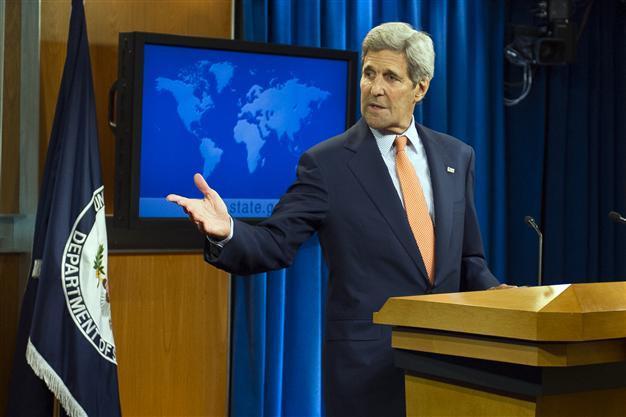Corruption impunity prevails and Turkey’s judiciary politicized: US human rights report
WASHINGTON

Secretary of State John Kerry asks an aide to bring him his crutches after speaking to the news media at the State Department in Washington, Thursday, June 25, 2015, as the State Department released it's annual human rights report. AP photo
The U.S.’s annual human rights report on Turkey has slammed a series of violations over the past year, focusing particularly on the judiciary, law enforcement agencies, freedom of expression and freedom of assembly.“The judiciary and law enforcement agencies were politicized, the government reassigned thousands of police and prosecutors in response to an anti-corruption investigation, the government closed the investigation and destroyed evidence,” the report presented by U.S. Secretary of State John Kerry on June 25 stated.
It cited Turkey’s most significant human rights problems in 2014 as impunity and weak administration of justice, government interference with freedom of expression and assembly, and inadequate protection of minority and vulnerable populations.
Human rights reports are released by the U.S. Department of State every year for all countries receiving assistance from Washington and all U.N. member countries.
The latest report on Turkey also criticized Ankara for not effectively implementing the law that provides criminal penalties for official corruption and said “some officials engaged in corrupt practices with impunity.”
Corruption cases against dozens of suspects originally detained in December 2013 on suspicion of bribery, money laundering, and misuse of state-owned land in real estate deals, were closed or not pursued, while thousands of police and prosecutors linked to the cases were reassigned, the report stated. It added that the government closed the investigation and destroyed evidence that was gathered, publicly accusing many police officers involved in the probe of a conspiracy to overthrow the government.
“Many of the suspects had family or business ties to the Justice and Development Party’s (AKP) top echelon.
Four ministers implicated in the scandal resigned from their ministries but continued as members of parliament. The constitution protects members of parliament from criminal investigation … but delegates investigatory responsibility to parliament itself. On Oct. 17, parliament convened a commission to conduct a long-delayed official investigation into corruption allegations against four former ministers, namely Erdoğan Bayraktar, Egemen Bağış, Zafer Çağlayan, and Muammer Güler. The inquiry had not reached a conclusion by year’s end. Immediately following the corruption allegations, however, the government opened misconduct cases against the police investigation,” it added.
The report also addresses the government’s interference with freedom of expression, stressing that the penal code and anti-terror law retain multiple articles that restrict freedom of expression, the press, and the Internet.
“At least seven journalists remained in jail at year’s end, most charged under the anti-terror law or for connections to an illegal organization. Self-censorship was common because journalists feared that criticizing the government could prompt reprisals,” it says.
The report says several organizations, including the Committee to Protect Journalists (CPJ) and Freedom House, reported Turkish authorities’ continued abuse of the anti-terror law and criminal code to prosecute journalists, writers, editors, publishers, translators, rights activists, lawyers, elected officials, and students.
“President Erdoğan frequently attacked journalists by name in response to critical reporting. In August 2014, while campaigning, Erdoğan targeted the Economist journalist Amberin Zaman over her remarks on Muslim society in a television program; Erdoğan called her a ‘shameless militant disguised as a journalist’ and told her to ‘know your place, you shameless woman.’ In September 2014, Ceylan Yeğinsu, a New York Times reporter based in Istanbul, had her photograph published on the front pages of pro-government newspapers and received thousands of threatening online messages after President Erdoğan took issue with a story she had written. Human rights and press freedom activists asserted authorities filed numerous civil and criminal complaints against journalists, authors, and publishers for ideological reasons under various laws that restrict media freedom,” it said.
The report also touches on worker rights issues and negligences in worker health and safety, citing the May 13, 2014 mine disaster in which 301 miners died of carbon monoxide poisoning after an explosion at a coalmine in Soma, in the western province of Manisa. Mine management at the time had shut off gas sensors, fire alarms, and communication systems to avoid slowing productivity, the report stated. Workers also reported that safety equipment at the mine was antiquated and faulty.
The report also refers to the mine disaster that killed 18 miners after they were trapped underground by a flood at a coalmine in the Ermenek district of the Central Anatolian province of Karaman on Oct. 28, 2014.
According to an expert report released on Nov. 26, 2014, the Energy Ministry’s General Directorate of Mining, along with two companies that operated the Ermenek mine, were responsible for the accident after reopening the mine prematurely following an inspection in August 2014.
















